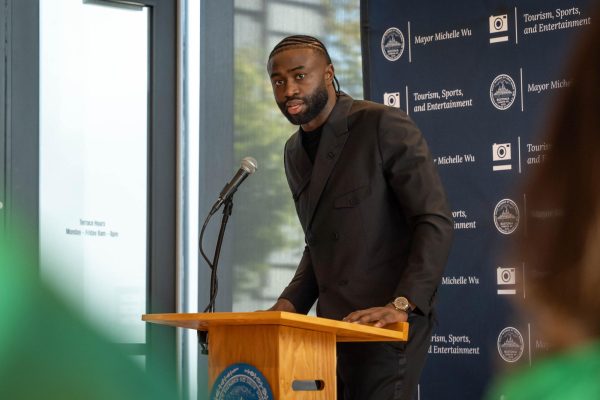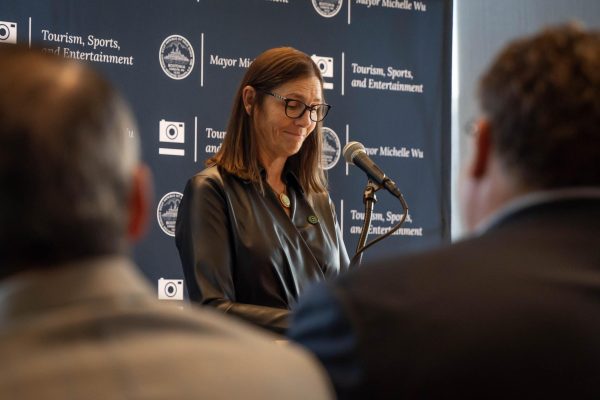Jeannine Russell took a long pause and observed the audience before her, tears in her eyes.
Massachusetts Gov. Maura Healey, Boston Mayor Michelle Wu, Boston Celtics leadership, players, and dozens of Celtics affiliates gathered on Monday to honor the legacy—both on and off the court—of Celtics legend Bill Russell and rename the North Washington Street Bridge to the William Felton “Bill” Russell Bridge.
Jeannine, Russell’s widow, said her husband’s legacy transcended beyond the basketball court to challenge injustices and inequality.
“In this way, he literally and figuratively, was a bridge for civil rights,” she said. “He spoke out when silence would have been easier. He stood up to injustice when he had something to lose.”
The newly named bridge stretches across the Charles River, connecting Charlestown to the North End. The bridge has been under construction since 2018, is set to be completed by 2025, and will include a plaque with Bill Russell’s name.
“Bill Russell was a legend both on and off the court,” said Celtics co-owner and president of the Boston Celtics Shamrock Foundation, Stephen Pagliuca.
Russell is famed for his unbeatable defense and record-breaking performance on the hardwood floor. He won 11 championships in 13 seasons, was a five-time MVP, and the only NBA player in history to have his number retired league-wide.
His impact travels beyond just the basketball court.
Russell was a trailblazer for Black equality. He was the first Black head coach in the NBA and used his platform to promote equal rights and activism. He marched with Dr. Martin Luther King Jr. and started a walkout in 1961 after fellow players faced racial discrimination in the city. Russell was awarded the Presidential Medal of Freedom in 2010 by former President Barack Obama. He died at the age of 88 in 2022.
“So we’re here for one reason: Because Bill Russell played a role in building something that we continue to believe in,” Wu told the crowd. “It’s fitting that a man known for his vision and determination to create bridges to our future will now always be commemorated on the gateway into Downtown Boston.”
Throughout his career, Russell also founded MENTOR, a youth mentoring program. The bridge also honors his work in fostering Boston’s youth and young athletes.
“He was brilliant, funny, and never stopped fighting for human rights for all and demanded we confront the past to better the present and future,” said David Shapiro, the former CEO of MENTOR and current CEO of YMCA Greater Boston.
Current Celtics small forward and shooting guard, Jaylen Brown, joked that he could be late to practice that day for the event. He highlighted the impact Russell’s legacy had on him and the rest of the team. Last year, Brown earned the Bill Russell NBA Finals MVP Award.
“I can speak on and on about his resume, but his character, his demeanor and how he handled himself through adversity, I think that speaks volumes, especially in a time like today,” Brown said. “I think it’s very fitting that the bridge is getting named after him, because what a bridge does is bring people together.”

Brown said he met Russell twice and remembers his smile that could “[light] up the entire room.” He added that as he continues his career, he hopes to “continue to walk in his life.”
The event’s speakers drew cheers and laughter. Jeannine Russell’s arrival prompted the audience to stand up in roaring applause. Attendees then sat quietly when she addressed the crowd.
She began speaking, sticking to notes on her phone. When she lifted her head, she paused to scan the room packed with those who came to honor her husband. She took a deep breath as tears began to stream down her face.

“As we dedicate this bridge, we are reminded that the road to justice, like the road to victory, is built step by step with strength, determination, teamwork and a vision for something greater,” she said.
“Bill’s legacy is not just in the games he won, but in the bridges he built for future generations to cross.”